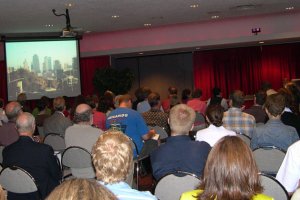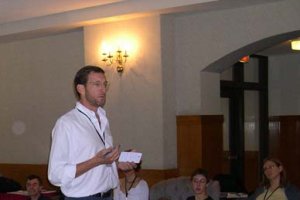Can a campus community become a "green" model for society as a whole? Educators, students, and professionals meet at an interdisciplinary conference to promote sustainability in education, research, operations and affiliated service organizations.
Greening of the Campus VI Conference, Sept 15-17, 2005, Ball State University, Muncie, Indiana
 Nearly 240 faculty, staff, students and professionals representing over 200 university campuses gathered last week at the Greening of the Campusconference to discuss how a campus community can become a "green" model for society as a whole.
Nearly 240 faculty, staff, students and professionals representing over 200 university campuses gathered last week at the Greening of the Campusconference to discuss how a campus community can become a "green" model for society as a whole.
The sixth in a series dating from 1996, this interdisciplinary conference is held every two years at Ball State University, Muncie, IN. The conference provides a forum for people representing diverse areas in university communities to share information on environmental issues. From practical day-to-day campus management to "green" curriculum development, participants of this conference are bound by common concerns for achieving environmental soundness through safe and sustainable management of resources.

The Greening of the Campus conference explores the evolving role of colleges and universities in cultivating awareness and understanding, and ability of students, faculty, professional staff and their many public constituencies to enhance the health and integrity of the places where they live and work. The theme of this year's conference was "Extending Connections," evocative of the collective spirit behind the ethic. Noted keynote speakers, paper presentations, poster sessions, workshops and focus group discussions were featured on various topics of interest to the higher education community.
A recurring theme in the six keynote addresses at this conference was the the impact and aftermath of Hurricane Katrina. Each keynote speaker offerred their view of how we may have inflicted it upon ourselves through poor environmental decisions and the need to make conscientious choices.
- David Orr, Professor and Chair of the Environmental Studies Program at Oberlin College cited critical failures in protecting our environment and emphasized the need for more action if we are to protect our environment for the future.
- Robert Berkebile, founding chairman of the American Institute of Architects Committee on the Environment and an influential environmentalist, promoted the notion of living buildings.
- Anthony D. Cortese, President of Second Nature, offered a comprehensive overview of the organizational aspects of the campus-sustainable movement and announced the formation of "Association for the Advancement of Sustainability in Higher Education" (AASHE) - the national professional association for sustainability coordinators, facilities officers, faculty, students, consultants and others working to infuse sustainability into higher education.
- Nan Jenks-Jay, Director of Environmental Affairs at Middlebury College, emphasized the relevance of regional sustainability and an account of her own experiences at Middlebury College.
- George Basile with The Natural Step spoke about the relevance of sustainable enterprise.
- Jonathan Harris, Director, Theory and Education Program at Global Development and Environment Institute at Tufts University focused on the economics of sustainable behavior.
Presentation topics covered were diverse and included:
- How colleges and universities are incorporating sustainability in their curriculum.
- The exploration of the indicators and measures of sustainability performance.
- The role of higher education in environmental education and research.
- Social, cultural and political issues and barriers to sustainability initiatives.
- Sustainable approaches to facilities planning and design.
- Sustainable campus transportation.
- Developing awareness and encouraging campus community involvement.

Several institutions have implemented comprehensive programs addressing the numerous aspects of sustainability. Initiatives that were showcased at the conference included those at Harvard University, Duke University and the University of Connecticut. Over 130 campuses have recently completed sustainability assessments, thereby giving them an informed view of where they need to focus their energies. Today, over 100 institutions have a sustainability coordinator positions, a phenomenal increase from even two years ago. These leaders are spearheading sustainability movements within their respective institutions, both sharing and learning from each other's institutional experiences. The importance of students in the success of sustainability initiatives at their respective colleges and universities was emphasized. Students' conviction and commitment to sustainability initiatives was commended.
There was also the emphasis on understanding of green house gas generations and discussions on how these can be reduced both directly and indirectly in an effort to meet the Kyoto Protocol. The concept of Renewable Energy Credits was expounded upon by several speakers, with Oberlin College having made significant strides.
Campus development and green buildings was another significant area of interest. Recognizing the market penetration of the LEED Rating System developed by the US Green Building Council, many presenters emphasized the importance of addressing campus development as an inter-related system and not just green buildings. University of Connecticut chose to address this gap through the development of institution specific Sustainable Design Guidelines.
The conference concluded with the resolve to continue to collaborate and build upon past experiences, and work towards a more sustainable future, one step at a time.
R. Umashankar is a landscape architect, architect and a LEED Accredited Professional. He has managed and worked on numerous eco-sensitive projects and master plans for higher-ed institutions.

Planetizen Federal Action Tracker
A weekly monitor of how Trump’s orders and actions are impacting planners and planning in America.

Chicago’s Ghost Rails
Just beneath the surface of the modern city lie the remnants of its expansive early 20th-century streetcar system.

Amtrak Cutting Jobs, Funding to High-Speed Rail
The agency plans to cut 10 percent of its workforce and has confirmed it will not fund new high-speed rail projects.

Ohio Forces Data Centers to Prepay for Power
Utilities are calling on states to hold data center operators responsible for new energy demands to prevent leaving consumers on the hook for their bills.

MARTA CEO Steps Down Amid Citizenship Concerns
MARTA’s board announced Thursday that its chief, who is from Canada, is resigning due to questions about his immigration status.

Silicon Valley ‘Bike Superhighway’ Awarded $14M State Grant
A Caltrans grant brings the 10-mile Central Bikeway project connecting Santa Clara and East San Jose closer to fruition.
Urban Design for Planners 1: Software Tools
This six-course series explores essential urban design concepts using open source software and equips planners with the tools they need to participate fully in the urban design process.
Planning for Universal Design
Learn the tools for implementing Universal Design in planning regulations.
Caltrans
City of Fort Worth
Mpact (founded as Rail~Volution)
City of Camden Redevelopment Agency
City of Astoria
City of Portland
City of Laramie


























